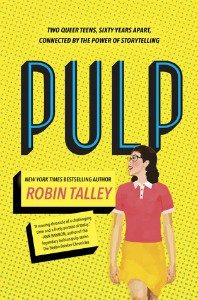Janet Jones and Abby Zimet are two lesbian teens living in Washington DC, separated by sixty-two years. In 1955, Janet discovers lesbian pulp fiction and finds herself truly represented for the first time in her life. In 2017, Abby decides to complete her senior project on lesbian pulp fiction, becoming obsessed with one particular author: Marian Love.
This is the second Robin Talley novel I’ve read in a short period of time, and to be perfectly frank I think I am falling in love. Her writing pulls me in from the moment I open the book and has me wanting to keep turning pages deep into the night, even when I know I will regret it in the morning. Her characters are real and independent, always having unique and powerful voices.
In Pulp, Talley does a magnificent job of contrasting the difference in the lives of two lesbian teenagers living in the same city only sixty-two years apart. While Janet struggles with the constant threat of being discovered (which would effectively ruin her life as she would lose her place in college, her job, and would be cut off completely from her family), Abby struggles with an ex-girlfriend who doesn’t seem to want to get back together as much as Abby does, and her parents’ inescapable divorce.
I will be honest – at some points in the novel, I felt frustrated with Abby because of this. Janet’s problems felt so much more real and life-altering, whereas Abby continually made poor decisions because of something that most likely over 50% of the population experiences. Talley deals with Abby’s parents failing marriage and the threat of Janet’s homosexuality being exposed with similar weight, which I felt was wasn’t completely fair. Yes, the point is that even though Abby doesn’t have to deal with as much oppression regarding her being a lesbian she still has problems, but those problems feel trivial when compared to Janet’s experiences.
Still, despite my frustrations with this comparison, I did appreciate that Talley allowed Abby to be a flawed human being. She doesn’t make perfect decisions (and she often doesn’t even make good decisions), but she grows from her mistakes, she learns from her failings, and by the end of the novel it is more than clear that she is headed down a good path.
The only other thing I was a little iffy about is that, in having Abby and Janet’s stories run concurrently, there was often a fair bit of repetition. [minor spoiler] It’s clear that Janet is Marian Love, the author that Abby becomes obsessed with. Often chapters told from Janet’s perspective mirror whatever Abby has just learned about her in the present, which can feel a bit redundant [end spoiler].
Overall, I found this book to be engaging and thought-provoking. Seeing the way lesbians were treated back in the 1950’s is horrendous, but also incredibly important. Getting to contrast that with the life of a modern lesbian, who came out at fourteen and is part of a friend group where everybody is queer, feels even more important. The message of this book is clear, and vital: don’t forget where we came from, and especially don’t forget who fought for all the rights we have in the present. Some of us younger queer people (myself included) often forget how things were, and how they still are in some parts of the world. We never, never should, and this book illustrates that perfectly.
WARNINGS: homophobia, internalized homophobia, sexism, misogyny, compulsory heterosexuality, heterosexism

